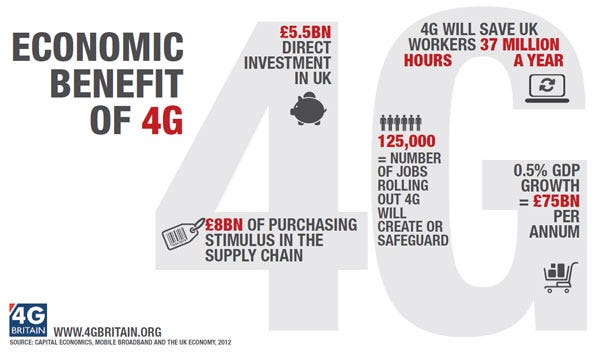Everything Everywhere campaigns for 4G approval
UK operator Everything Everywhere is campaigning for permission to launch 4G services before its domestic competitors. To support its plea to regulator Ofcom, the operator has commissioned research that outlines the “significant economic and social benefits” that will come about by bringing 4G to the UK.
April 30, 2012

UK operator Everything Everywhere is campaigning for permission to launch 4G services before its domestic competitors. To support its plea to regulator Ofcom, the operator has commissioned research that outlines the “significant economic and social benefits” that will come about by bringing 4G to the UK.
According to the research, conducted by macroeconomic research consultancy Capital Economics, 4G rollout will attract £5.5bn private investment into the UK economy, create or safeguard 125,000 jobs and add 0.5 per cent to the country’s GDP by the end of the decade (or £7.5bn per annum). In addition, 4G will provide access to mobile superfast broadband to at least 10 million people who won’t be able to get fixed line superfast broadband before 2020, the research claims.
The operator, formed by the merger in the UK between T-Mobile and Orange, is in a position to offer 4G mobile services in the UK by the end of 2012, after Ofcom initially accepted an application to use its existing 1800MHz spectrum to deliver LTE services.
However, Vodafone, O2 and 3UK are waiting until Ofcom’s 800MHz and 2.6GHz auction, due to be held later this year, in order to gain the spectrum necessary to roll out their LTE services, and are opposing Everything Everywhere’s attempts to roll out LTE services ahead of the auction.
“The research shows that rolling out 4G will kick start a new cycle of investment and innovation in internet services and mobile devices for consumers, and productivity benefits for businesses,” said Mark Pragnell of Capital Economics, the report’s author. “It also shows how giving Britain a world class digital infrastructure will make it more globally competitive and attract new business start-ups.”
Matthew Howett, practice leader for regulation at research firm Ovum believes Ofcom is right to be considering the option of allowing Everything Everywhere to use its existing spectrum to roll out LTE services, but warned that consumers will only see the true benefit if there is competition between operators in the provision of services.
“This can only be fully achieved through the joint award of spectrum at 800MHz and 2.6GHz planned for the end of this year,” he said.
“With no obvious way out of the deadlock any legal challenge could send everyone back to the drawing board. Only a direction from the UK government could keep the auction on track and this is something that it must now wake up to.”
He added that if pressure mounts on Ofcom to allow Everything Everywhere to use its existing 1800MHz now for 4G then it has to consider how to safeguard competition, and stated that the regulator has at least a couple of options:
“It could consider imposing a wholesale access obligation on Everything Everywhere to allow other interested operators the opportunity to also launch services. This could be removed once the award of new spectrum eventually takes place. However this would not be quick or easy.
“Alternatively competition could come from whoever acquires the 1800MHz spectrum that Everything Everywhere must divest, which was one of the conditions of allowing T-Mobile and Orange to merge in the first place. At the moment the other operators do not hold sufficient quantities of 1800MHz spectrum to launch 4G in any compelling way. This would require Ofcom preventing Everything Everywhere deploying 4G at 1800MHz until it has completed the sale of this spectrum.”
He added that neither of these two options are ideal, which makes the importance of proceeding with the joint award of new spectrum at 800MHz and 2.6GHz later this year that more important.
However, Nicholas Ott, MD for Arqiva’s government, mobile and enterprise, stated that the UK is already running later than other EU countries in rolling out its 4G services, and revealed that Ofcom is under pressure from the EU to begin provisioning the launch of 4G services as soon as possible.
“Brussels has given direction to all European regulators to allow the refarming of the 900MHz and 1800MHz spectrums for 4G. One year ago, it allowed refarming from 2G to 3G, and now it is saying the same for 4G.”
“Ofcom has an obligation to answer to Brussels. If Ofcom believes it will not be fair or relevant to allow Everything Everywhere to use its existing spectrum, it would have to have a very robust case to say to Brussels that it is not going to do it now, but will postpone it instead.”
Ott argued that that the direction from the EU is not about allowing Everything Everywhere to refarm its 1800MHz spectrum for 4G, but to allow 900MHz and 1800MHz spectrums to be refarmed for 4G. He said that there is nothing to prevent O2 and Vodafone from refarming part of their 900MHz spectrum in 4G.
“The technology is available – there is commercially open 900MHz LTE services in Sweden. Vendors such as NSN, Ericsson, Huawei and ZTE will all tell you that 4G 900MHz is available – it may not be quite as advanced as 1800MHz services, but it is still LTE.”
However, Ovum’s Howett cautioned that in the UK, the 900MHz band is currently congested with 3G services and would have to be freed up, which would put off operators from using the spectrum to launch LTE services.

About the Author
You May Also Like










.png?width=300&auto=webp&quality=80&disable=upscale)


_1.jpg?width=300&auto=webp&quality=80&disable=upscale)